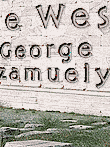An
EU army, on the other hand, makes sense. Small though it
may be, it symbolizes the emergence of a European superstate.
Naturally Cohen hates the idea. Without NATO life has no
meaning: "If ... they [the Europeans] try to or are
desirous of a separate operational planning capability,
separate and distinct from NATO itself, then that is going
to weaken the ties between the United States and NATO, and
NATO and the EU." These "ties" serve to ensure
permanent European subordination to the United States. The
Europeans well know this, which is why they want to wind
NATO down. But they have to do this surreptitiously, of
course. For the time being the EU badly needs NATO’s resources.
NATO owns all the military bases, as well as all the intelligence-gathering
facilities. Exploiting NATO resources is not the same thing
as subordinating oneself to NATO. Like most of today’s Washington
policymakers or policy wonks, Cohen sounds as if he is a
relic of a bygone era, forever nostalgic for the good old
days. "Every European member of NATO has only one set
of forces and one defense budget, not one force and one
budget for NATO and another force and military budget for
the EU," he harrumphed, "Therefore I proposed
as part of the proposed NATO-EU link a common defense planning
process involving all 23 NATO and EU countries as the only
logical and cost effective way to insure the best possible
coordination of limited forces and resources." The
proposal, needless to say, fell on deaf ears.
Britain’s
Tory Euroskeptics, on the other hand, greeted Cohen’s strictures
warmly. Their leader, as always, is Margaret Thatcher. While
the Rupert Murdoch and Conrad Black-owned media bestow lavish
attention on them, they enjoy virtually no support in the
country. Unpopular though Tony Blair may be, no one doubts
that he will win the General Election – probably next
year – very comfortably. On the tenth anniversary of
her downfall last month, Thatcher launched into a ferocious
attack on the proposed EU army. She called it a "monumental
folly that puts our security at risk in order to satisfy
political vanity." Somewhat inconsistently she then
went on to ridicule the whole idea: "Europe has even
less chance of becoming a military power than of creating
a sound currency," she spluttered. Quite how an idea
that has no hope of ever getting off the ground can also
a mortal threat to the security of Britain, neither she
– nor any other Euroskeptic – ever bothers to
explain.
The
European Union military will undoubtedly get off the ground.
The EU will eventually challenge the United States for global
primacy. But what kind of EU it will be remains an open
question. Will the EU constitute an alternative model to
US-style capitalism? Or, in the desperate attempt to take
on the United States, will the EU emerge as yet another
political entity dominated by the giant transnational corporations?
For example, business interests are forever whining about
Europe’s excessively high wages, tight regulations, powerful
trade unions, high taxes, lavish welfare payments, and long
vacations. We have become "uncompetitive," they
cry. Europe must become more entrepreneurial, more like
the United States. Following every election, governments
in France and Germany invariably promise to cut back on
the welfare state. The people respond by going on strike,
and the governments are forced to back down. Faced by almost
certain election defeat, governments abandon their "reformist"
ideas.
Today,
Europe’s businessmen are pushing hard for European expansion
to the East. Admitting the former Soviet bloc countries
into the EU will give Europe’s corporations access to cheap
labor, which could then be used to cut incomes in the West.
To attract investment, individual countries would have to
be able to set their own labor and environmental standards,
as well as their own tax policies. Ordinary Europeans, however,
have not the slightest intention of permitting their wage
levels to drop. This is why European governments are under
pressure to insist on uniform labor and environmental standards
across Europe. Businesses in Europe, unlike the United States,
are restricted as to what they can do. They are unable to
move their factories to the Third World to take advantage
of cheap labor there and then expect to reimport their products
back into Europe. Any transnational corporation that wants
to invest in Europe thus has to follow the strict guidelines
of Brussels.
Businesses
favor a looser EU. Politicians responding to popular pressure
push for a tighter EU. The thirteen East European countries
seeking EU membership will have to adopt current EU practices
on currency, taxation, subsidies, and land ownership. Moreover,
EU institutions are being reformed so as to make sure that
they cannot veto policies set by the EU leaders. The larger
European states are to be given more weight while the veto
rights of individual members are to be restricted. Gone
will be the principle of unanimity, according to which every
EU country has to agree on a policy before it could be adopted.
At present 20 percent of the decisions of the European Council
of Ministers – on such issues as taxation and defense
– require unanimity. The remaining 80 percent require
only a so-called "qualified majority" – 62
of the 87 votes in the Council of Ministers. A vote of 26
is considered a "blocking vote," sufficient to
kill a measure. Germany, Britain, France and Italy each
have ten votes on the Council of Ministers. Yet Germany
has a population of nearly 83 million, while the other three
are at around 60 million. The Netherlands, on the other
hand, with 15 million, and Portugal with 10 million, each
have five votes.
One
aim of the current Nice summit is to extend the number of
issues which can be settled by majority voting. This is
a little tricky. For every country invariably has one issue
on which it feels very strongly. For Spain it is regional
aid. For Britain it is taxation. For Germany it is immigration
and asylum. For France it is international trade and services.
Another aim is to see that the number of votes on the Council
of Ministers reflects the relative population levels of
individual countries. If current practices continue, following
the accession of 12 new member-states, Germany, Britain,
France and Italy would have only 40 out of some 134 votes
on the Council of Ministers. Italy has proposed giving Germany
33 votes, and 30 each to the other three large countries.
Luxembourg would have three votes. The French, not surprisingly,
are not happy. It violates the principle of Franco-German
parity that had been the driving principle of European unity.
The Germans are also proposing something called a "double
majority." According to this, a measure would pass
if supported both by a majority of the member states and
by a majority of the EU’s population. France rejects this
as well, since again this would serve to increase German
dominance.
Reform
of the European Commission is also being proposed. Currently,
there are 20 seats on the European Commission. Ten countries
get one seat each and five countries – Germany, France,
Britain, Italy, and Spain – get two. No one wants a
European Commission of 30 Commissioners. So the big states
say they will give up their second Commissioner, so long
as the small states give up their single Commissioner.
Europe’s
problem is that it cannot challenge the United States unless
it becomes a coherent political entity. This means that
it cannot allow itself to get bogged down in interminable
internecine disputes among tiny states. The reform proposals
currently on the table all involve limiting the sovereignty
of small European states. Yet there is probably no other
way. We saw during the bombing of Yugoslavia last year ho
awful it was that there existed no power on earth that could
do anything to thwart the will of the United States. A strong
Europe is desirable precisely in order to achieve a balance
of power. But there is more. Europe may yet come to be a
model of a desirable way of life. In Europe shareholder
value is not the answer to every question. People are not
sacrificed for the sake of higher profit margins. Americans
may find the European way of life not to their taste. But
we are living in the twilight of the post-Cold war era where
too many people are finding that the American way of life
is not to their taste.
Please
Support Antiwar.com
Send
contributions to
Antiwar.com
520 S. Murphy Avenue, #202
Sunnyvale, CA 94086
or
Contribute Via our Secure Server
Credit Card Donation Form

Your
Contributions are now Tax-Deductible










